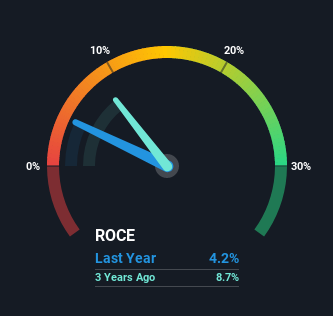Some Investors May Be Worried About United Nilgiri Tea Estates' (NSE:UNITEDTEA) Returns On Capital

There are a few key trends to look for if we want to identify the next multi-bagger. Firstly, we'd want to identify a growing return on capital employed (ROCE) and then alongside that, an ever-increasing base of capital employed. Put simply, these types of businesses are compounding machines, meaning they are continually reinvesting their earnings at ever-higher rates of return. However, after investigating United Nilgiri Tea Estates (NSE:UNITEDTEA), we don't think it's current trends fit the mold of a multi-bagger.
What is Return On Capital Employed (ROCE)?
Just to clarify if you're unsure, ROCE is a metric for evaluating how much pre-tax income (in percentage terms) a company earns on the capital invested in its business. The formula for this calculation on United Nilgiri Tea Estates is:
Return on Capital Employed = Earnings Before Interest and Tax (EBIT) ÷ (Total Assets - Current Liabilities)
0.042 = ₹72m ÷ (₹1.8b - ₹71m) (Based on the trailing twelve months to March 2021).
So, United Nilgiri Tea Estates has an ROCE of 4.2%. In absolute terms, that's a low return and it also under-performs the Food industry average of 11%.
See our latest analysis for United Nilgiri Tea Estates

Historical performance is a great place to start when researching a stock so above you can see the gauge for United Nilgiri Tea Estates' ROCE against it's prior returns. If you'd like to look at how United Nilgiri Tea Estates has performed in the past in other metrics, you can view this free graph of past earnings, revenue and cash flow.
What Does the ROCE Trend For United Nilgiri Tea Estates Tell Us?
In terms of United Nilgiri Tea Estates' historical ROCE movements, the trend isn't fantastic. Around five years ago the returns on capital were 17%, but since then they've fallen to 4.2%. However it looks like United Nilgiri Tea Estates might be reinvesting for long term growth because while capital employed has increased, the company's sales haven't changed much in the last 12 months. It's worth keeping an eye on the company's earnings from here on to see if these investments do end up contributing to the bottom line.
In Conclusion...
Bringing it all together, while we're somewhat encouraged by United Nilgiri Tea Estates' reinvestment in its own business, we're aware that returns are shrinking. And with the stock having returned a mere 4.6% in the last five years to shareholders, you could argue that they're aware of these lackluster trends. Therefore, if you're looking for a multi-bagger, we'd propose looking at other options.
If you'd like to know about the risks facing United Nilgiri Tea Estates, we've discovered 4 warning signs that you should be aware of.
If you want to search for solid companies with great earnings, check out this free list of companies with good balance sheets and impressive returns on equity.
When trading United Nilgiri Tea Estates or any other investment, use the platform considered by many to be the Professional's Gateway to the Worlds Market, Interactive Brokers. You get the lowest-cost* trading on stocks, options, futures, forex, bonds and funds worldwide from a single integrated account. Promoted
New: AI Stock Screener & Alerts
Our new AI Stock Screener scans the market every day to uncover opportunities.
• Dividend Powerhouses (3%+ Yield)
• Undervalued Small Caps with Insider Buying
• High growth Tech and AI Companies
Or build your own from over 50 metrics.
This article by Simply Wall St is general in nature. It does not constitute a recommendation to buy or sell any stock, and does not take account of your objectives, or your financial situation. We aim to bring you long-term focused analysis driven by fundamental data. Note that our analysis may not factor in the latest price-sensitive company announcements or qualitative material. Simply Wall St has no position in any stocks mentioned.
*Interactive Brokers Rated Lowest Cost Broker by StockBrokers.com Annual Online Review 2020
Have feedback on this article? Concerned about the content? Get in touch with us directly. Alternatively, email editorial-team (at) simplywallst.com.
About NSEI:UNITEDTEA
United Nilgiri Tea Estates
Engages in growing, manufacturing, and selling teas in India.
Flawless balance sheet average dividend payer.
Market Insights
Community Narratives



